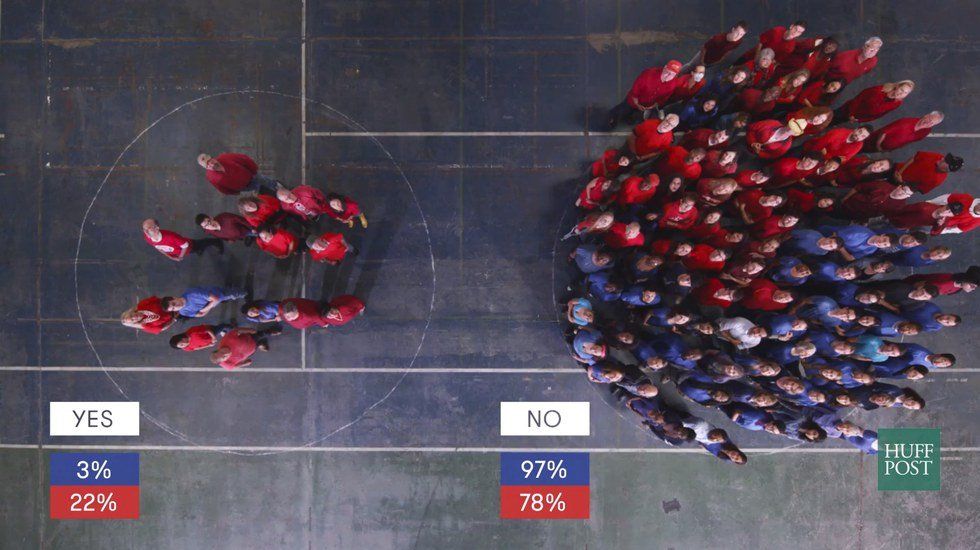The Huffington Post and WatchCut Video recently posted three episodes of a political experiment on their YouTube pages for a short series entitled "Yes / No: Republicans and Democrats." In the studies, they asked 60 Republicans and 60 Democrats a series of questions and had them walk to a circle marked "yes" or "no." The purpose behind this was to discover how different, but also how alike the two parties are, and the results are worth looking into.
Episode 1
Question 1: Is climate change a hoax?
Yes = 3% Democrat, 22% Republican
No = 97% Democrat, 78% republican
Question 2: Do you have a college degree?
Yes = 58% Democrat, 55% Republican
No = 42% Democrat, 45% Republican
Question 3: Should children born in the U.S. to undocumented immigrants be deported?
Yes = 2% Democrat, 28% Republican
No = 98% Democrat, 72% Republican
Question 4: Would Bernie Sanders make a good president?
Yes = 88% Democrat, 17% Republican
No = 12% Democrat, 83% Republican
Question 5: Would Donald Trump make a good president?
Yes = 0% Democrat, 23% Republican
No = 100% Democrat, 77% Republican
Episode 2
Question 1: Are you a person of faith?
Yes = 42% Democrat, 85% Republican
No = 58% Democrat, 15% Republican
Question 2: Does Kim Davis have a religious right to refuse marriage licenses to gay couples?
Yes = 1% Democrat, 43% Republican
No = 99% Democrat, 57% Republican
Question 3: Should children be vaccinated?
Yes = 98% Democrat, 78% Republican
No = 2% Democrat, 22% Republican
Question 4: Would you consider yourself pro-choice?
Yes = 100% Democrat, 40% Republican
No = 0% Democrat, 60% Republican
Question 5: Would you consider yourself pro-life?
Yes = 10% Democrat, 75% Republican
No = 88% Democrat, 25% Republican
Undecided = 2%
Episode 3
Question 1: Have you ever smoked marijuana?
Yes = 65% Democrat, 60% Republican
No = 35% Democrat, 40% Republican
Question 2: Should police wear body-mounted cameras while they are on duty?
Yes = 98% Democrat, 82% Republican
No = 2% Democrat, 18% Republican
Question 3: Do you own a gun?
Yes = 13% Democrat, 42% Republican
No = 87% Democrat, 58% Republican
Question 4: Do you support increased gun control?
Yes = 92% Democrat, 27% Republican
No = 8% Democrat, 73% Republican
Question 5: Should Edward Snowden be tried for espionage?
Yes = 20% Democrat, 43% Republican
No = 80% Democrat, 57% Republican
As you can see, this experiment did an efficient job of literally analyzing real people's views as opposed to assuming and limiting their perspectives based on their political party. A major issue we face in America currently is how our culture tends to stifle the concept of an individual being capable of creating unique, more-abstract thoughts that differ greatly from a label they identify with -- and this is especially prevalent in modern politics. As George Washington predicted through this statement made in his Farewell Address in 1796:
"However [political parties] may now and then answer popular ends, they are likely in the course of time and things, to become potent engines, by which cunning, ambitious, and unprincipled men will be enabled to subvert the power of the people and to usurp for themselves the reins of government, destroying afterwards the very engines which have lifted them to unjust dominion."
By this, he meant that political parties, although serve well in certain situations, have become an easy form of segregation among Americans, causing more problems than solutions. With how progressive society is currently becoming, we must aim to break down these barriers of hate between separate groups and view them rather as ways to amplify certain ideas that we personally support, but do so in a respectful, not demeaning manner toward beliefs opposite to ours. To quote two of the subjects that took part in the study (one Democrat and one Republican): "...the answers were a lot less polarizing than I thought they would be" and "I was very appreciative of the camaraderie in spite of the political views." I think that the individuals involved in the videos learned a valuable lesson that no matter how different we are, we all have much more in common than we initially perceive, and therefore should act accordingly.





















